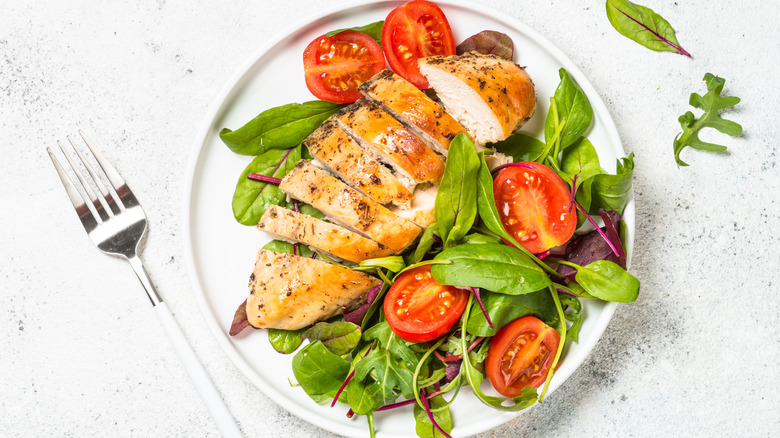Does The Keto Diet Affect Breast Milk Supply?
The keto diet (or ketogenic diet) has gained popularity in recent years as both a weight-loss diet and a way to manage and improve certain health conditions, explains Healthline. It involves cutting the number of carbohydrates ingested on a daily basis in order to encourage the body to use fat bodies, known as ketones, for fuel, rather than glucose.
In the standard ketogenic diet, per Healthline, only 10% of daily calories come from carbs. The main focus is on fat (70%), followed by protein (20%). When the body enters ketosis (burning fat for fuel), it uses the fat stored in the body, which brings about weight loss for many people who adhere to the diet. Additionally, burning fat instead of glucose has shown benefits for certain health conditions, including diabetes and epilepsy.
When following the keto diet, the idea is to avoid starchy carbs, including potatoes, corn, bananas, pineapple, beans, legumes, pasta, rice, wheat, breakfast cereals, and more, according to MedicalNewsToday. The focus is on fruit, oils, nuts, seeds, and butter for fat sources and lean meats, fish, and eggs for protein. Beverages are also limited to water, bone broth, and unsweetened tea and coffee.
While the keto diet is accessible to many different types of individuals, so long as it is followed safely and approved by a doctor, some people should avoid it altogether — including anyone who is breastfeeding.
The keto diet could put a breastfeeding individual at risk
WebMD explains that due to the lower caloric intake and restriction of certain food groups that come along with the keto diet, it isn't recommended for breastfeeding individuals. As a general rule, not ingesting enough calories on a day-to-day basis can lead to a drop in breast milk production. Johns Hopkins Medicine points out that anyone who is breastfeeding will need around 1,800 calories a day. However, this varies depending on the individual and their specific needs, and it can be higher.
Healthline adds that the ketosis process causes a person to require additional hydration, which also happens to be a requirement when breastfeeding to maintain milk supply. When an individual combines a keto diet and breastfeeding, the higher fluid demands can make it difficult for the body to keep up breast milk supply.
In rare cases, a keto diet can also put a breastfeeding individual at risk of a serious condition known as ketoacidosis (via Healthline). This is when high levels of ketones in the body turn the blood acidic. It can cause life-endangering symptoms, including chest and abdominal pain, vomiting, and difficulty breathing. It is thought that failing to consume enough calories while eliminating most carb dietary sources — coupled with metabolic changes and the need for more calories during breastfeeding — can send a person into ketoacidosis due to starvation (per WebMD).


